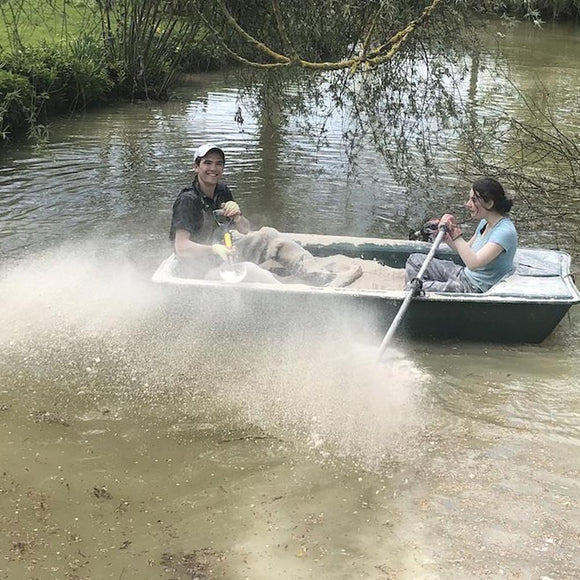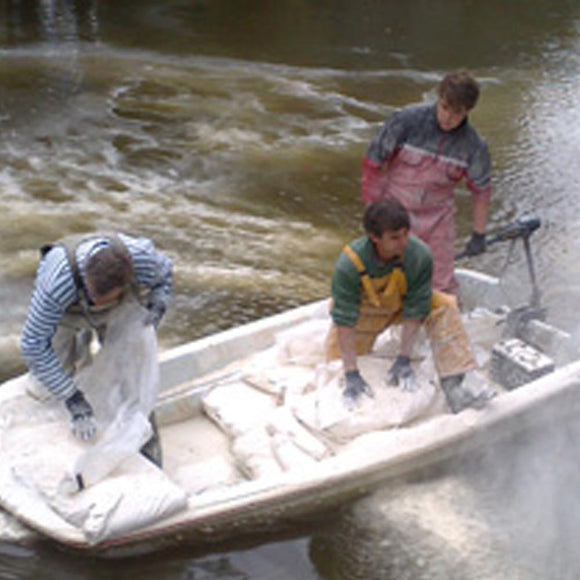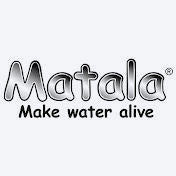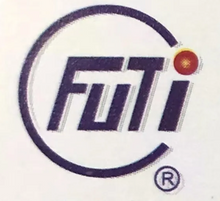Ultra Fine granulated chalk is sold under many trade names has been used in the fish farming industry for many years. It helps to slightly raise the pH of the water, allows beneficial bacteria to penetrate deeper into the silt creating the right conditions for it to be consumed. Getting rid of this sludge helps to starve the duckweed of it food source.
All water bodies whether fisheries, general recreation or wildlife sanctuaries suffer from an increasing deterioration of water quality. This is caused primarily by the deposition of organic material decaying, rotting on the pond or lake base. This process causes a decrease in oxygen and an increase in acidification.
This organic material takes many forms but is usually made up of deposited leaf from surrounding vegetation. A large deciduous tree will drop the equivalent of a lorry load of leaves every Autumn. As you can imagine, if this lorry arrived at the edge of your water and tipped its contents, I am sure you would envisage some deterioration of water quality. The accumulative effect of having several trees dropping their leaves each Autumn will inevitably cause a water quality problem.
The application of ultra-fine chalk facilitates the breakdown of the organic silt. The microscopic partials of chalk sink into the silt layer creating the right environment for bacterial activity as well as buffering the pH.
- This reduction of silt ultimately increases water depth
- Improves water quality clarity by settling suspended solids
- It reduces methane production by the silt body
- Counteracts acidity in the water and silt
- Provides essential calcium for flora and fauna in the wildlife pond creating greater biodiversity.
It is not only the external invasive material but also aquatic vegetation that can increase the burden of de-oxygenation and acidification. Obviously, during Winter the aquatic plant life dies, creating a gradual build-up of residue and deteriorating water quality is inevitable. If you are involved in active weed treatment, then some measures must be taken to resolve the issue of the dead material.
All this organic material will inevitably cause water quality problems after a time. However, if treated it can be beneficial in providing essential nutrients. If neutralised and oxidised it can provide nutrient for the small plant and animal organisms. These will then provide food for the larger creatures, up the food chain to the fish.
How it works.
Ultra fine granulated chalk starts the process of neutralisation and aeration by penetrating the bottom layers of silt which have built up over the years. This creates a medium where bacterial break down by aerobic micro-organisms can take place. The alkalinity of the chalk can reduce acidity of the material and provide essential calcium for plant and animal organisms. Levels of silt are reduced and more water depth is created.
Where can it be used?
Ultra-fine granulated chalk can be used in ponds, lakes, reservoirs and canals where organic silt is a problem. It can also be used to raise the pH of a water body when suffering from acidification from woodland run-off.
How the chalk is applied.
However, this can be doubled in severe cases of silt build-up. Repeat treatment is carried out after 18 months at a half rate, but obviously this depends on the extent of the problem after an individual assessment of each water area.
Combined with aeration, this is a great addition to many lakes and ponds.
Dosage rate is 1 x 25kg bag per 50 square meters. You spread it evenly over the surface area of the pond, ideally from a boat.
Supplied in 25kg bags






